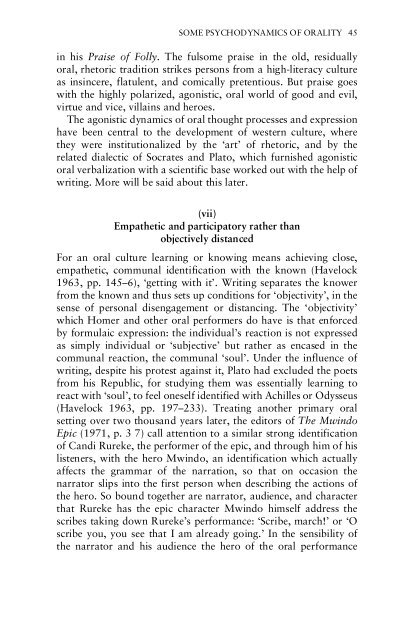Orality and Literacy: The Technologizing of the Word - Monoskop
Orality and Literacy: The Technologizing of the Word - Monoskop
Orality and Literacy: The Technologizing of the Word - Monoskop
You also want an ePaper? Increase the reach of your titles
YUMPU automatically turns print PDFs into web optimized ePapers that Google loves.
SOME PSYCHODYNAMICS OF ORALITY 45<br />
in his Praise <strong>of</strong> Folly. <strong>The</strong> fulsome praise in <strong>the</strong> old, residually<br />
oral, rhetoric tradition strikes persons from a high-literacy culture<br />
as insincere, flatulent, <strong>and</strong> comically pretentious. But praise goes<br />
with <strong>the</strong> highly polarized, agonistic, oral world <strong>of</strong> good <strong>and</strong> evil,<br />
virtue <strong>and</strong> vice, villains <strong>and</strong> heroes.<br />
<strong>The</strong> agonistic dynamics <strong>of</strong> oral thought processes <strong>and</strong> expression<br />
have been central to <strong>the</strong> development <strong>of</strong> western culture, where<br />
<strong>the</strong>y were institutionalized by <strong>the</strong> ‘art’ <strong>of</strong> rhetoric, <strong>and</strong> by <strong>the</strong><br />
related dialectic <strong>of</strong> Socrates <strong>and</strong> Plato, which furnished agonistic<br />
oral verbalization with a scientific base worked out with <strong>the</strong> help <strong>of</strong><br />
writing. More will be said about this later.<br />
(vii)<br />
Empa<strong>the</strong>tic <strong>and</strong> participatory ra<strong>the</strong>r than<br />
objectively distanced<br />
For an oral culture learning or knowing means achieving close,<br />
empa<strong>the</strong>tic, communal identification with <strong>the</strong> known (Havelock<br />
1963, pp. 145–6), ‘getting with it’. Writing separates <strong>the</strong> knower<br />
from <strong>the</strong> known <strong>and</strong> thus sets up conditions for ‘objectivity’, in <strong>the</strong><br />
sense <strong>of</strong> personal disengagement or distancing. <strong>The</strong> ‘objectivity’<br />
which Homer <strong>and</strong> o<strong>the</strong>r oral performers do have is that enforced<br />
by formulaic expression: <strong>the</strong> individual’s reaction is not expressed<br />
as simply individual or ‘subjective’ but ra<strong>the</strong>r as encased in <strong>the</strong><br />
communal reaction, <strong>the</strong> communal ‘soul’. Under <strong>the</strong> influence <strong>of</strong><br />
writing, despite his protest against it, Plato had excluded <strong>the</strong> poets<br />
from his Republic, for studying <strong>the</strong>m was essentially learning to<br />
react with ‘soul’, to feel oneself identified with Achilles or Odysseus<br />
(Havelock 1963, pp. 197–233). Treating ano<strong>the</strong>r primary oral<br />
setting over two thous<strong>and</strong> years later, <strong>the</strong> editors <strong>of</strong> <strong>The</strong> Mwindo<br />
Epic (1971, p. 3 7) call attention to a similar strong identification<br />
<strong>of</strong> C<strong>and</strong>i Rureke, <strong>the</strong> performer <strong>of</strong> <strong>the</strong> epic, <strong>and</strong> through him <strong>of</strong> his<br />
listeners, with <strong>the</strong> hero Mwindo, an identification which actually<br />
affects <strong>the</strong> grammar <strong>of</strong> <strong>the</strong> narration, so that on occasion <strong>the</strong><br />
narrator slips into <strong>the</strong> first person when describing <strong>the</strong> actions <strong>of</strong><br />
<strong>the</strong> hero. So bound toge<strong>the</strong>r are narrator, audience, <strong>and</strong> character<br />
that Rureke has <strong>the</strong> epic character Mwindo himself address <strong>the</strong><br />
scribes taking down Rureke’s performance: ‘Scribe, march!’ or ‘O<br />
scribe you, you see that I am already going.’ In <strong>the</strong> sensibility <strong>of</strong><br />
<strong>the</strong> narrator <strong>and</strong> his audience <strong>the</strong> hero <strong>of</strong> <strong>the</strong> oral performance

















